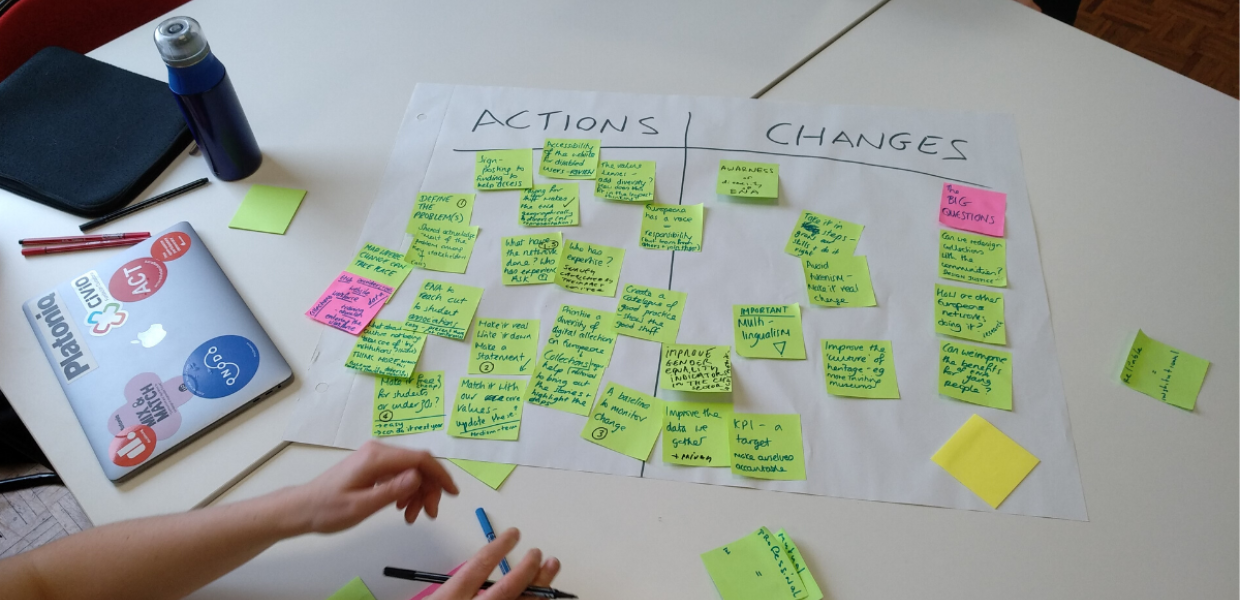How did this inclusivity and diversity session go for you?
Tola Dabiri - It was an extremely good session with a very receptive audience. I had been quite concerned about how the session would be received as I believe I was one of only two people of colour at the conference. But it was great and I believe that there is a lot of enthusiasm to widen the network and meet the challenges that may arise from this.
Larissa Borck - I think the first big step was in fact that we had such a session at Europeana’s annual conference. This shows that there is a significant number of people interested in having this conversation - and the second big step was that participants actually showed up for the session and joined the discussion. So that was already a first success. The session was a starting point so that we strive towards a more inclusive and diverse Europeana community.
What is the most important issue you think the session tackled?
TD - I hope that I managed to communicate that projects and reports alone will not increase diversity and inclusion, but that it is important to work with diverse communities so that barriers to access and participation can be identified and removed.
LB - In my view, Tola and I had a lot of common points in our talks, especially when talking about potential hurdles for people to join networks such as Europeana. In order to lower the barriers in the way to become an active member of ENA, we have to identify the blind spots: who is not yet joining our discussions? Who do we leave out? We have to open spaces for these groups and listen to them in order to find out how the network might be exclusive to them.
From your own experience, what would you recommend to continue this conversation?
TD - I think that it would be good to undertake a mapping exercise to understand the many ways that diversity is identified and described by Europeana members in different nations, and what work to increase diversity and inclusion has already taken place. I believe that this would lead to the development of a shared understanding across the network. I also agree with Larissa that this should involve diverse communities who are not currently engaged with Europeana.
LB - It is a great first step to have a task force on new professionals now, because it enables us to work on this topic. But it is equally important that this is not just the work of the few members of the group, but that we gather many different perspectives in order to not only include our experiences, but also those of a diverse range of people from outside of the network. If we just talk to those who are already members of our community, we will not be able to make our network better.
What changes would you like to see addressed before the next Europeana 2020 conference?
TD - I would definitely like to see greater diversity, either from within Europe or from greater interaction with other international networks from across South America, Asia and sub-Saharan Africa, if this can be done in a sustainable, cost effective and eco-friendly way!
LB - Conferences can be a great way to get to know people who can help you on your transition from university to the workforce, but they tend to be expensive in terms of fees and travel costs. And when you’re there, it can be very hard to actually get in touch with the right people, because you might not know anyone. Europeana 2020 should therefore create possibilities for students and new professionals to take part; for example as a helping hand in exchange for free access to the conference or with a scholarship. The next point is helping them to get to know the community - having a conference buddy for example can help or creating a space dedicated for people to get to know each other.
Find out more and get involved
As a result of this Europeana 2019 conference session, we know that many of you want to continue to talk about inclusivity and diversity; explore what it means to develop an open, safe and accessible space to work; and share knowledge within the Europeana Network Association and its Communities. If you would like to shape these discussions, provide feedback, or tell us about your experiences, please join the Inclusivity and Diversity community or email your feedback to Europeana.




